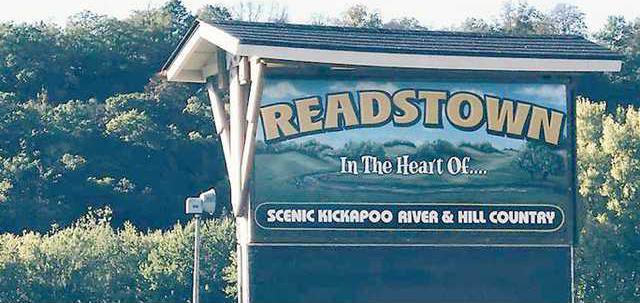READSTOWN - There’s a river of thought running through communities up and down the Kickapoo Valley about what the future of the villages located in the floodplain will be. Citizens with homes and businesses are facing hard decisions, and many villages are coming together to vision their future in planning meetings.
The Village of Readstown is no exception, having been hit hard in the 2018 floods. Like their neighbors to the north – Viola, LaFarge and Ontario – Readstown’s citizens have had another wake up call, and are faced with the need to have critical discussions and make decisions that will affect the future of their communities.
The community has called a meeting to discuss their future on Tuesday, March 5, from 6 to 8 p.m., at the Village of Readstown Municipal Building.
“It isn’t the village board that has called for this discussion,” said village clerk Susan Mueller. “This is a community meeting, and once we talk things out and come up with some ideas, then it will go to the village board.”
The meeting announcement shares six questions that will form the framework of the discussion:
• What do you like about Readstown?
• What do you want in Readstown, both tangible and intangible?
• What might prevent Readstown from achieving its goals?
• What might be done with the land in the floodplain?
• What information does the village need right now?
• Who should be included in this conversation?
Damages severe
According to Mueller, who is responsible for enforcing the Village of Readstown’s zoning ordinance, there are 11 homes in the floodplain that are too damaged to be repaired. The village’s Advancement Association Building in the park also suffered severe damage, and cannot be repaired.
“The morning before the flood we met and decided to get everything out of the park that we could,” Mueller said. “Due to our proactive efforts, we saved most of the village property we had down there, but we are always faced with repairs to the electricity for our properties in the park.”
According to Mueller the village paid $7,000 to repair the electricity in 2016; $3,000 in 2017; and in 2018 everything was damaged, bringing the repair amount facing the village to $13,000.
“I’ve submitted the application for mitigation on the Advancement Association Building, and our emergency siren,” Mueller said. “We need to find a way to move that facility out of the floodplain so that we’re not constantly faced with paying for the repairs.”
Mueller explained that the biggest problem facing the village is the lack of available land for homeowners looking to relocate.
“We need to bring our community together to take a look at the issues in front of us, and to discuss what might be possible,” Mueller said. “One issue that we need to explore is if it would be possible for landowners with empty lots out of the floodplain to make those lots available to people who need a place to relocate.”
The greatest fear is that residents who relocate will choose to move outside the village. If the village population plummets, then that could result in everyone’s taxes, and water and sewer bills going up.
One resident’s take
Readstown resident Vicki Howell Schneider was one of the fortunate residents whose home was not affected by the 2018 flood.
“Have you thought about what the last flood did to our little community,” Schneider asked. “The houses, homes, structures that we lost. Yes, some still stand, but sadly they are a loss and will need to be removed when weather warms up and the snow is gone.”
Schneider echoed village clerk Susan Mueller in expressing hope that the community would come together around a more sustainable vision for the future of the village.
“In saying this, our small village needs to rise up above this and rebuild,” Schneider said. “To do this we need to find property in which we can rebuild and unite to do so. This isn't a one-man job or even just a job for those affected. This is a job where the whole community needs to step up and help make decisions.”
Mueller explained that either the community will come together through this visioning process, or they will stand back and “let the community die.”
“Sadly, if we don’t rise up and rebuild, the effects will be felt by everyone in this village,” Schneider said. “The tax income lost, the money from water and sewer lost, are just a few examples. These will need to be made up, and to do this, everyone in the village will feel it.”




